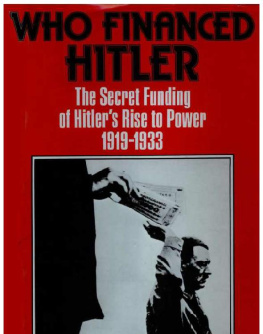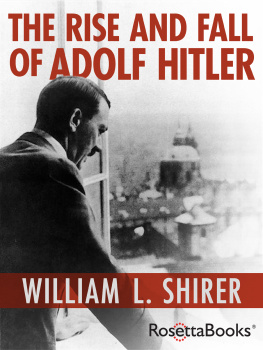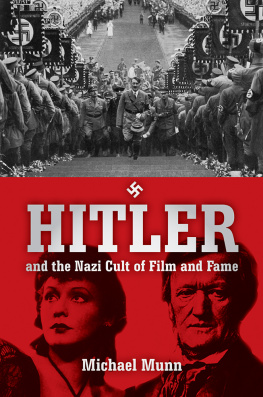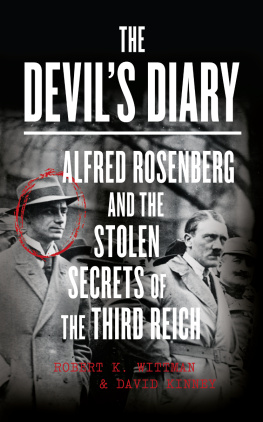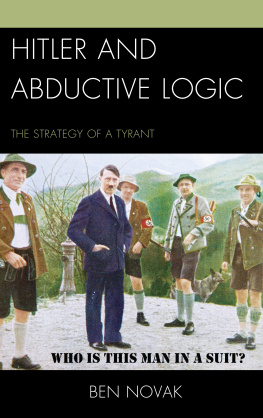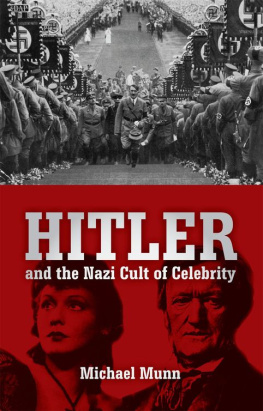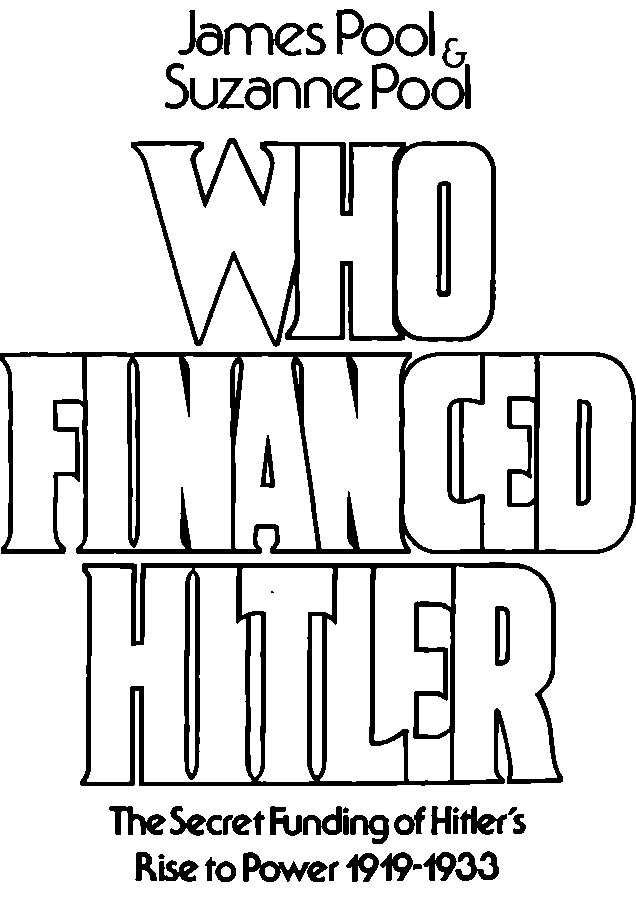A RAVEN BOOK
MACDONALD AND JANES LONDON
A Raven Book This is a joint project of
Macdonald and Janes Publishers Limited and Futura Publications Limited
First published in Great Britain in 1979 by Macdonald and Janes Publishers Limited Paulton House 8 Shepherdess Walk London N1 7LW
ISBN 0 354 04395 1
Reproduced from camera-ready copy supplied Printed and bound in Great Britain by Richard Clay (The Chaucer Press) Limited Bungay, Suffolk
Many of those who have contributed valuable information wish to remain anonymous for reasons which are easily understood. Although we can not mention everyone individually, we would like to express our sincere gratitude to all of those who have assisted in making this book possible.
Contents
If money go before, all ways do lie open. Shakespeare
Preface
Adolf Hitler did not come to power easily. He began his political career in 1919 and did not become Chancellor until fourteen years later in 1933. During this time it took a tremendous sum of money to support the Nazi Party. Where it came from, who provided it, and why, are the topics of this book.
There have been many books written on the Nazi period, but this most important aspect of Hitlers activityone of the very keys to his successhas never been dealt with. One reason is that much of the information about financial contributions has only recently come to light, but the primary reason is an understandable reluctance to acknowledge the ease with which money can subvert the democratic process.
History is replete with unsavory tales of political financing, and there is a serious question whether democratic principles can ever ultimately be upheld in an atmosphere of unsupervised and unpublicized political fund raising. Perhaps the newly created German democracy was more vulnerable than most free societies, yet the story of how Hitler found the necessary money to undermine the Weimar Republic has universal implications.
In Germany from 1919 to 1933, political parties were little more than tools for powerful interest groups. Hitler was quick to recognize this and turn his formidable and nefarious talents to the task of fund raising. His methods were unscrupulous. At first he courted the powerful; then as his party grew in size and strength, he was perfectly willing to use blackmail and bribery to gain his ends. But it must be admitted that he knew the value of money: that it could purchase almost all the necessary resources of politics, such as propaganda campaigns, newspaper coverage, full-time staff, etc. In short, Hitler knew that money meant power.
It is even partly true that Hitler was able to sell an evil idea like anti-Semitism simply because he had the support of wealthy contributors. By continuous propaganda even the greatest untruth will be believed by some people. There were many anti-Semites in Germany long before Hitler, but they belonged to small splinter parties that were ineffective because of their endless squabbling. Large donations provided Hitler with the needed tools to organize these fringe elements and turn them into a major political force.
Discovering the exact sums of contributions and the identity of contributors is not an easy task. Money moves silently as well as easily. Cash leaves no tracks. Checks can be launderedpassed through intermediaries and false corporationsto obscure the original source of funds. But, despite the difficulties, the search is worthwhile. Money is the tracer element in the study of political power. Light thrown upon transactions involving financing illuminates the flow of both influence and power.
Hitler was launched on his political career by a wealthy and powerful secret society, none of whose members were big businessmen. Other funds came from the most unexpected sources. Germanys most important Jewish industrialist even gave to the Nazisto make them dependent on his money in hopes of eventually disrupting them. Hitler got some of his biggest contributions by first discovering the corrupt dealings between certain big industrialists and prominent liberal politicians, and then blackmailing the industrialists with threats of exposure.
Hitlers fund raising gave birth to many of the techniques of covert funding and dirty tricks that later became the stock-in-trade of most major governments. The double subsidiary corporations through which Captain Ernst Rohm channeled army funds to Hitler were so secret in their operations that, even after the government became aware of the missing money, the corporations were able to continue functioning undetected for about a year.
One of the most important and unexpected discoveries of this study is the importance of foreign financing in bringing Hitler to power. Hitler received money from Austria, Britain, Czechoslovakia, Finland, France, Italy, Holland, Hungary, Switzerland, Sweden, and the United States. It is true that some money came from Germans living in these countries, but most of it came from prominent foreign citizens. Their motives varied: Henry Ford wanted to spread his anti-Semitic philosophy Mussolini hoped to encourage German fascism, Grand Duchess Victoria of Russia wanted to support anti-Communism, Sir Henri Deterding aimed to get back his oil interests confiscated by the Communists, etc.
Those who financed Hitler, both Germans and the foreigners, are just as responsible for his coming to power as the active Nazis who spread anti-Semitic propaganda or fought in the streets. Yet, because of their influence and the power of money few of them were prosecuted at Nuremberg. Many are now exposed here for the first time.
1 A MYSTERIOUS BEGINNING
In the first week of January 1931 an important dinner party was held at Hermann Gorings residence outside of Berlin. The hostess was Gorings beautiful and charming wife Carin, a Swedish baroness by birth. Among the guests were Adolf Hitler, the Prince and Princess zu Wied; Fritz Thyssen, a multimillionaire industrialist who was chairman of the board of Germanys largest firm, the United Steel Works; Ernst Tengelmann, the wealthy director of an important Ruhr coal mining company; and Dr. Hjalmar Schacht and his wife.
Dr. Schacht, a prominent banker, was generally regarded as Germany's financial wizard. In 1923 he had been appointed Special Commissioner to stabilize the inflated mark. Shortly after his outstanding success, he became president of the Reichsbank (Germanys national bank). Politically; Schacht was a moderate liberal who had been one of the founders of the German Democratic Party, but when the Allies continued to force Germany to pay heavy reparations, Schacht resigned his office in disgust. He was, however, still a great power in the financial world and sat on the boards of several important banks and corporations.
Schacht had never met Hitler before and although he was curious about the man, he was skeptical. After the many rumors that we had heard about Hitler, wrote Schacht, and the published criticisms we had read of him, we were pleasantly impressed. The Nazi leader arrived wearing dark trousers, the brown uniform jacket of the Party, a white shirt, and dark tie. His appearance, said Schacht, was neither pretentious nor affected.
The meal was a rather simple but wholesome one: pea soup, pork, potatoes and vegetables, and for dessert Swedish apple tart with vanilla ice cream. After dinner the guests retired to the drawing room. Hitler sat near Carin Goring, who was resting on the couch because of her Weak heart condition. He was in a jovial mood and entertained the ladies with some amusing stories.

